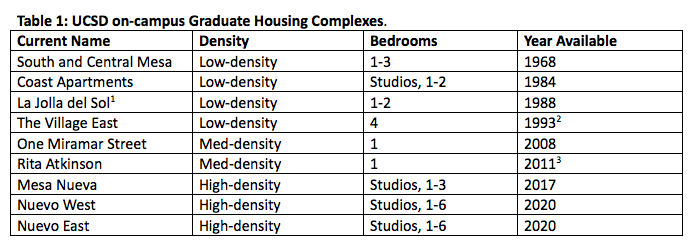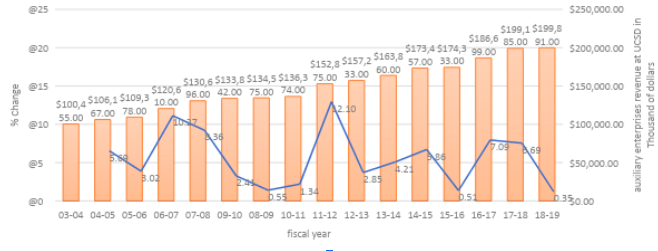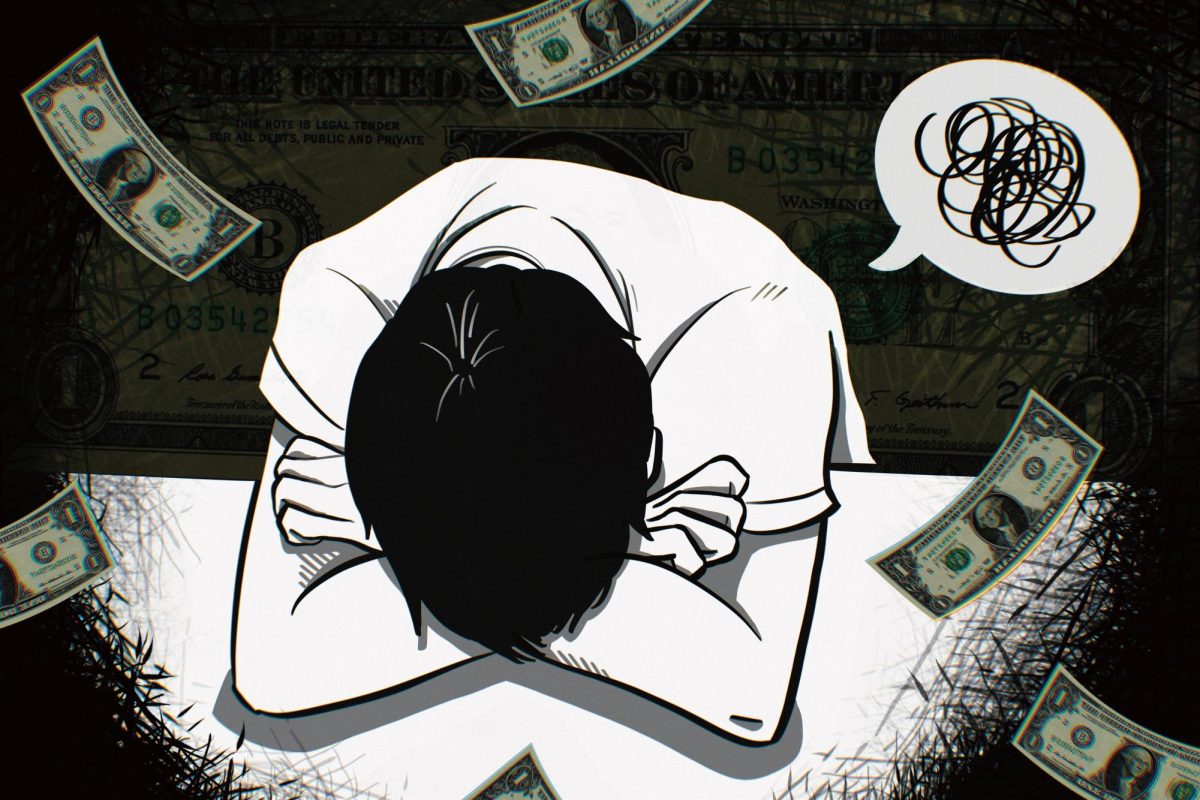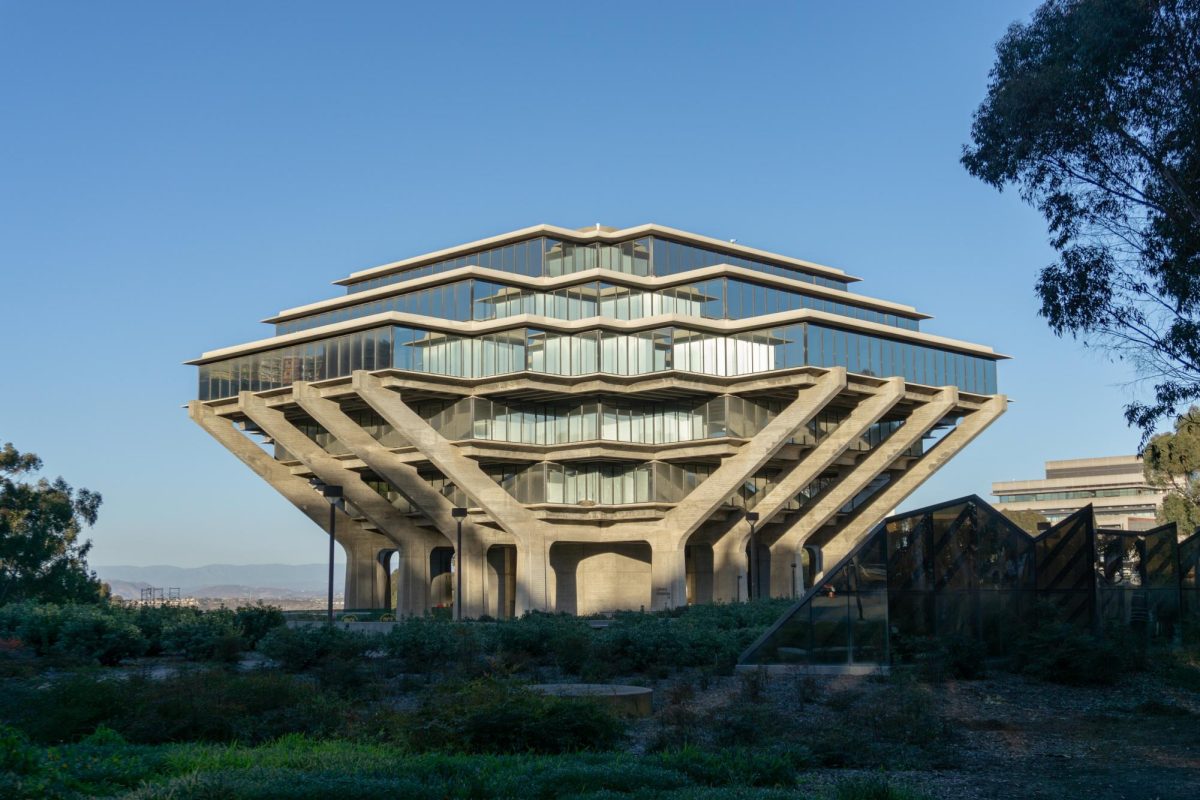by Gabriel Ascui, Kristin Leadbetter and Muhammad Yousuf
This article was compiled with the help of members of the HDH Resident Coalition, and sheds light onto the increasing prices of housing for graduate students and the struggles that they have faced during the COVID-19 pandemic.
A graduate student doesn’t require that many things to study, generally speaking: a laptop, reliable internet, and hopefully, loads of caffeine. However, these are all things that come after satisfying one’s basic needs: healthcare, transportation, food, and housing. We would like to provide some perspective on the ongoing struggle grad students at UC San Diego are confronted with regarding this last item: housing.
The first graduate housing units at UC San Diego, South and Central Mesa, were built in 1968 with 256 individual two-bedroom apartments. These facilities allowed for the recruitment of brilliant students and researchers who were unable to afford rent in the scarce, costly La Jolla housing market. The increase in enrolled graduate students came with an increase in the demand for student housing, thus new complexes were built. This situation also pushed UCSD’s administration to incorporate a two-year rental limit for all graduate and professional student housing in 2008. As a reference of where are we now, Table 1 has a summary of historically available graduate housing.

For several years now, gradual increases in rental rates have been imposed on students, greatly exceeding the rates of inflation. In 2015, the construction of the Mesa Nueva apartment complex was approved by the UC Board of Regents. This project committed UCSD Housing Dining Hospitality to increase all rental rates by 3% per year until 2025. This agreement, together with recent Public-Private Partnership deals for the construction and rental of Nuevo East and Nuevo West complexes, has contributed to a devastating increase in on-campus housing costs. These budgetary maneuvers shifted a great financial burden onto already underpaid graduate students. As reported by the Student Housing Association, between 2016 and 2020, the average on-campus housing rent has gone up 37% while grad students’ stipends have only increased 9%. Additionally, a recent survey conducted by the UCSD Graduate Student Association found that although 40% of PhD students live in supposedly “affordable” on-campus housing, over 75% of residents are considered “rent burdened” or paying more than 33% of monthly income in housing costs as defined by the US Department of Housing and Urban Development.
Thus, the immediate question that comes to mind is: Why? To answer this question, we need to take a deeper look at current trends in UCSD policy.
As a public university system, the University of California is financed by the state with public funds and bonds. In recent years, however, the UC system has tended to externalize several essential services –housing being one of them. While available documentation is scarce, we believe HDH used to be an official University Department until 2008 ‚— housing was formerly administered by the “Department of Housing and Food Administration,” then the “Department of Housing and Dining Services”. Today, HDH is considered an Auxiliary Enterprise, which means it does not receive public funding and must instead be self-sustaining; in this case, that means HDH must finance itself solely through revenue: student rent rates. During fiscal year 2018-19, approximately 4% of UCSD’s revenue came from Auxiliary Enterprises like HDH (Figure 1).

Although revenues are at a all-time high, HDH’s annual budget presented to the Graduate & Family Housing Advisory Committee (GFHAC), formerly Associated Residential Community Housing Advisory Committee (ARCHAC), in 2020 shows that HDH has an egregious financial deficit. This drove their office to initially propose even higher rent increases, up to 6% for some units. One element of this deficit is that through fiscal year 2020-21, over $30,000,000 will be paid to the owners of the Nuevo East and West complexes as “assessments.”In other words, public funds and students’ stipends are bleeding into the pockets of private investors and HDH administrators, thus yet again accelerating students’ impoverishment. These trends have motivated the recent Cost-of-Living Adjustment campaign at UCSD, the Academic Student Employee strike at UC Santa Cruz in 2019-2020, the ongoing Rent Strike at UCLA, and the formation of the HDH Resident Coalition.
This is a duplicitous strategy of privatization, as “auxiliary” status permits HDH to evade accountability, transparency, and operate outside of UCSD’s governance. For instance, in 2019, when ARCHAC, an advisory committee comprise of students and staff, voted 6-0 for a rent freeze for residents in Grad and Family Housing, HDH callously ignored this recommendation and still raised the rent. This event has made explicit the lack of democratic, shared governance at UCSD, as our campus is plagued with advisory committees. Furthermore, HDH has repeatedly and knowingly presented false information in their financial reports to the committee, only admitting to it when students found discrepancies in the numbers.
It’s important to consider that on-campus residents comprise some of the most vulnerable populations of undergraduate and professional students, as living off-campus in La Jolla or greater San Diego can be extremely expensive and with limited access to campus and on-campus resources. Even HDH and UCSD acknowledge this fact, as a rent deferral system during economic hardship, food pantries and basic needs centers, and short-term loan programs are available to students. These are not benevolent signs of a compassionate university–they are symptoms of a system which recognizes that we are not paid enough to live where we work, and that we do not have access to truly affordable housing.
Nowadays, in the midst of a global pandemic that has disrupted the lives of millions, graduate students included, HDH has deemed it acceptable to further burden us, increasing rent once again for residents in Grad and Family Housing. This rent increase comes after in June, during the height of the pandemic, HDH “temporarily” laid off 200 workers, most of whom are of marginalized backgrounds. In July 2020, students asked HDH to provide clarity on why they were still paying for amenities which remain shut down due to the pandemic. HDH refused to provide a breakdown of how rent is distributed and refused to consider a remission of fees. Unsatisfied residents asked HDH to hold a Town Hall regarding the lack of reliable, consistent information. HDH again refused. HDH has refused time and time again to even openly communicate with the residents they claim to serve.
The COVID-19 pandemic has intensified graduate and professional students’ vulnerabilities. In particular, our homes have become our workplaces. In this unique moment, our education has been reduced to Zoom meetings, our homes turned into work spaces, and the undue stress and frustration caused by HDH has adversely affected our ability to do the work we came to UCSD to do. This fact even motivated a formal grievance by the UCSD Unit of the Student-Workers Union, United Auto Workers 2865, to ensure HDH was actually guaranteeing a safe working and living environment for student-workers. Although HDH assured us that they would improve their communication with students, information regarding housing policies for the “Return to Learn” program at UCSD have been confusing and unclear, as evident with the high volume of questions that arose for students from different forums and town halls organized by the GSA and UAW. The behavior of HDH and its leaders is a flagrant display of disregard and contempt for the needs, concerns, and livelihoods of residents. Their actions and attitudes directly contradict their stated Principle of Community committed to the creation and maintenance of a climate of “fairness, cooperation, and professionalism.”
In order to maintain UCSD’s status as a world-renowned educational and research institution, talented students of all backgrounds must be able to have their basic rights met so they can focus on cutting-edge research and the production and acquisition of knowledge. None of this is possible when HDH places its debt burden on residents as rent burden. None of this is possible when the majority of residents, students, and workers face consistent and constant financial precarity. Housing is a right that all students should be guaranteed.





















chin woo • Dec 27, 2020 at 5:58 pm
ohh, i am in need of it word counter
Carl • Nov 22, 2020 at 6:23 am
I am glad that you shared this interesting topic. I plan to cover it in my coursework. It is good that I can always count on https://writemytermpapernow.com/ when I am in a hurry.
Donald • Oct 31, 2020 at 2:59 pm
I liked the way you covered the issue of graduate school, housing and viruses. I absolutely agree with you that you don’t need a lot to study – it’s a laptop, the Internet and a lot of coffee, but sometimes circumstances don’t go our way, and problems arise with studies. In order to solve them successfully and on time, you can always turn to the writing specialists for help, the most important thing is to choose a good service.
Olivia • Oct 25, 2020 at 9:19 am
This year, the pandemic sends us to a special learning environment, but the issue of scholarships and grants remains relevant. Unfortunately, very often the issue of financing studies becomes a serious obstacle for students. But don’t get discouraged. Many universities around the world and non-profit organizations offer talented students full scholarships or significant discounts on tuition.